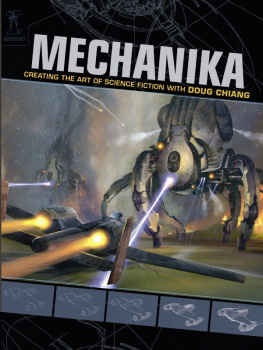For Brian Chiang and Jenna Felice
Were the tower to be laid down across the plain of Shinar, it would be two days journey to walk from one end to the other. While the tower stands, it takes a full month and a half to climb from its base to its summit, if a man walks unburdened. But few men climb the tower with empty hands; the pace of most men is slowed by the cart of bricks that they pull behind them. Four months pass between the day a brick is loaded onto a cart, and the day it is taken off to form a part of the tower.
Hillalum had spent all his life in Elam, and knew Babylon only as a buyer of Elams copper. The copper ingots were carried on boats that traveled down the Karun to the Lower Sea, headed for the Euphrates. Hillalum and the other miners traveled overland, alongside a merchants caravan of loaded onagers. They walked along a dusty path leading down from the plateau, across the plains, to the green fields sectioned by canals and dikes.
None of them had seen the tower before. It became visible when they were still leagues away: a line as thin as a strand of flax, wavering in the shimmering air, rising up from the crust of mud that was Babylon itself. As they drew closer, the crust grew into the mighty city walls, but all they saw was the tower. When they did lower their gazes to the level of the river-plain, they saw the marks the tower had made outside the city: the Euphrates itself now flowed at the bottom of a wide, sunken bed, dug to provide clay for bricks. To the south of the city could be seen rows upon rows of kilns, no longer burning.
As they approached the city gates, the tower appeared more massive than anything Hillalum had ever imagined: a single column that must have been as large around as an entire temple, yet rising so high that it shrank into invisibility. All of them walked with their heads tilted back, squinting in the sun.
Hillalums friend Nanni prodded him with an elbow, awestruck. Were to climb that? To the top?
Going up to dig. It seems unnatural.
The miners reached the central gate in the western wall, where another caravan was leaving. While they crowded forward into the narrow strip of shade provided by the wall, their foreman Beli shouted to the gatekeepers who stood atop the gate towers. We are the miners summoned from the land of Elam.
The gatekeepers were delighted. One called back, You are the ones who are to dig through the vault of heaven?
We are.
The entire city was celebrating. The festival had begun eight days ago, when the last of the bricks were sent on their way, and would last two more. Every day and night, the city rejoiced, danced, feasted.
Along with the brickmakers were the cart-pullers, men whose legs were roped with muscle from climbing the tower. Each morning a crew began its ascent; they climbed for four days, transferred their loads to the next crew of pullers, and returned to the city with empty carts on the fifth. A chain of such crews led all the way to the top of the tower, but only the bottommost celebrated with the city. For those who lived upon the tower, enough wine and meat had been sent up earlier to allow a feast to extend up the entire pillar.
In the evening, Hillalum and the other Elamite miners sat upon clay stools before a long table laden with food, one table among many laid out in the city square. The miners spoke with the pullers, asking about the tower.
Nanni said, Someone told me that the bricklayers who work at the top of the tower wail and tear their hair when a brick is dropped, because it will take four months to replace, but no one takes notice when a man falls to his death. Is that true?
One of the more talkative pullers, Lugatum, shook his head. Oh no, that is only a story. There is a continuous caravan of bricks going up the tower; thousands of bricks reach the top each day. The loss of a single brick means nothing to the bricklayers. He leaned over to them. However, there is something they value more than a mans life: a trowel.
Why a trowel?
If a bricklayer drops his trowel, he can do no work until a new one is brought up. For months he cannot earn the food that he eats, so he must go into debt. The loss of a trowel is cause for much wailing. But if a man falls, and his trowel remains, men are secretly relieved. The next one to drop his trowel can pick up the extra one and continue working, without incurring debt.
Hillalum was appalled, and for a frantic moment he tried to count how many picks the miners had brought. Then he realized. That cannot be true. Why not have spare trowels brought up? Their weight would be nothing against all the bricks that go up there. And surely the loss of a man means a serious delay, unless they have an extra man at the top who is skilled at bricklaying. Without such a man, they must wait for another one to climb from the bottom.
All of the pullers roared with laughter. We cannot fool this one, Lugatum said with much amusement. He turned to Hillalum. So youll begin your climb once the festival is over?
Hillalum drank from a bowl of beer. Yes. Ive heard that well be joined by miners from a western land, but I havent seen them. Do you know of them?
Yes, they come from a land called Egypt, but they do not mine ore as you do. They quarry stone.
We dig stone in Elam, too, said Nanni, his mouth full of pork.
Not as they do. They cut granite.
Granite? Limestone and alabaster were quarried in Elam, but not granite. Are you certain?
Merchants who have traveled to Egypt say that they have stone ziggurats and temples, built with limestone and granite, huge blocks of it. And they carve giant statues from granite.
But granite is so difficult to work.
Lugatum shrugged. Not for them. The royal architects believe such stoneworkers may be useful when you reach the vault of heaven.
Hillalum nodded. That could be true. Who knew for certain what they would need? Have you seen them?
No, they are not here yet, but they are expected in a few days time. They may not arrive before the festival ends, though; then you Elamites will ascend alone.
You will accompany us, wont you?
Yes, but only for the first four days. Then we must turn back, while you lucky ones go on.
Why do you think us lucky?
I long to make the climb to the top. I once pulled with the higher crews, and reached a height of twelve days climb, but that is as high as I have ever gone. You will go far higher. Lugatum smiled ruefully. I envy you, that you will touch the vault of heaven.
To touch the vault of heaven. To break it open with picks. Hillalum felt uneasy at the idea. There is no cause for envy he began.
Right, said Nanni. When we are done, all men will touch the vault of heaven.
The next morning, Hillalum went to see the tower. He stood in the giant courtyard surrounding it. There was a temple off to one side that would have been impressive if seen by itself, but it stood unnoticed beside the tower.
He could sense the utter solidity of it. According to all the tales, the tower was constructed to have a mighty strength that no ziggurat possessed; it was made of baked brick all the way through, when ordinary ziggurats were mere sun-dried mud brick, having baked brick only for the facing. The bricks were set in a bitumen mortar, which soaked into the fired clay, forming a bond as strong as the bricks themselves.
The towers base resembled the first two platforms of an ordinary ziggurat. There stood a giant square platform some two hundred cubits on a side and forty cubits high, with a triple staircase against its south face. Stacked upon that first platform was another level, a smaller platform reached only by the central stair. It was atop the second platform that the tower itself began.












